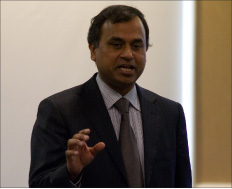
By Glenn Eisenberg
Correspondent
The presence of children in the military is a problem seen throughout much of the world, according to Siddharth Chatterjee, a United Nations Children’s Fund (UNICEF) director and senior fellow at the Woodrow Wilson School of Public and International Affairs at Princeton University.
The politics forum, “Demobilization of Child Soldiers in Sudan: A Story Change,” took place in the Business Building lounge on March 31. In his presentation, Chatterjee spoke of the need to eliminate the use of children as soldiers and the United Nations’ ability to help in that pursuit.
“These are the people who represent the future,” Chatterjee warned.
In 2000, Chatterjee served as a program manager with UNICEF in Southern Sudan in a mission to demobilize child soldiers involved with the Sudan People’s Liberation Army (SPLA).
The demobilization mission sought to convince the SPLA to allow as many children as possible to leave the militia.
Despite hesitations of the U.N. in the past, Chatterjee insisted on the need to negotiate with leaders of the SPLA.
“If you don’t engage with them, they will perpetuate misery and tyranny on their own people,” Chatterjee said of the SPLA leaders.
Chatterjee was able to negotiate with the then head of the SPLA’s military wing, and current president of the newly independent Southern Sudan, Salva Kiir Mayadirt.
According to Chatterjee, UNICEF avoided proselytizing. UNICEF simply informed Mayadirt that the use of children for military purposes was wrong and emphasized instead the potential political benefits of complying with U.N. Convention on the Rights of the Child. The Convention is signed by all countries except Somalia and the United States.
Mayadirt saw the demobilization as an opportunity to “accentuate (his) authority,” Chatterjee explained, and, as a result, over 3,500 children were demobilized.
The children were then transported to temporary “transit camps” for several months to protect them from the potential dangers of ongoing warfare at home.
At the camps, the children played games, put on plays and were provided with new clothing, cooking tools and mosquito nets.
When it was clear that conditions would be safer for them, the children were returned home.
Chatterjee emphasized that although the mission had been successful in demobilizing thousands of child soldiers, the first time such a feat had been accomplished with a guerilla army, the use of children for military purposes continues to be an ongoing problem.
In many parts of the world, Chatterjee said, indoctrination of children continues to be “enforced by sheer violence and punishment.”
According to Chatterjee, systemic factors, such as poverty and easy access to weapons, contribute to the exploitation of children for military purposes, with many youths seeing “guns as a meal ticket.”
Chatterjee informed the audience that in regions where economic, political or social strains exist, anger will build up, and there must be a way for youth to channel that anger into positive nonviolent movements rather than joining a military or guerilla army.
Chatterjee ended his lecture by stating, “If there is one serious malady in this world … it is using our children in conflicts.”






